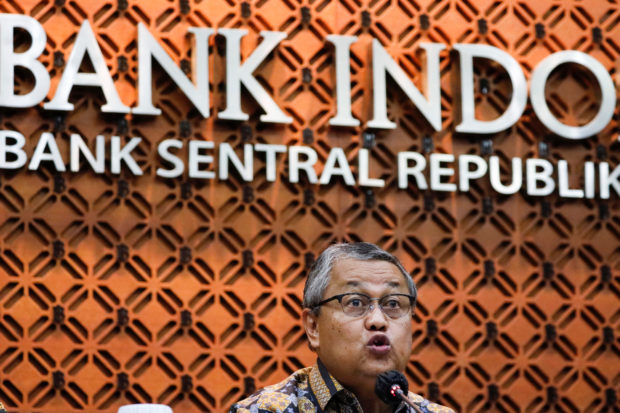
Indonesia’s Central Bank Governor Perry Warjiyo speaks during a media briefing at Bank Indonesia headquarters in Jakarta, Indonesia, Jan 19, 2023. REUTERS/Ajeng Dinar Ulfiana/File photo
JAKARTA – Indonesia’s central bank governor Perry Warjiyo secured on Monday approval from a key parliamentary body for his reappointment for a second term, after pledging to maintain a “pro-stability” monetary stance until 2024.
Warjiyo’s five-year term as Bank Indonesia (BI) chief ends in May. Full parliamentary approval is still needed for his reappointment, though lawmakers typically follow the financial committee’s recommendation based on a so-called “fit-and-proper test”.
Earlier on Monday, Warjiyo vowed to strengthen BI’s policy mix to achieve its price stability goal as well as supporting sustainable economic growth, giving a nod to a recently passed law that widened BI’s mandate to include propping up growth.
“This year and next year, we will direct our monetary policy to guard stability, while other policies … we will direct to support economic growth,” he said.
BI would lower its inflation target to a 1.5 percent to 3.5 percent range in the medium term, compared with the current target of 2 percent to 4 percent, he said.
Inflation in Southeast Asia’s largest economy has stayed above target since last year amid high global commodity prices.
Warjiyo repeated that BI’s interest rate hikes totaling 225 basis points between August to January were sufficient to guide inflation back to within target later this year.
“We will focus a lot on the stability of the rupiah exchange rate,” he said, citing global uncertainties such as the war in Ukraine and rate hikes in the United States.
In his presentation materials, Warjiyo displayed an outlook for economic growth to accelerate to a range of 4.9 percent to 5.7 percent in 2025 and 5.1 percent to 5.9 percent in 2028.
BI’s 2023 economic growth outlook was in the upper end of a 4.5 percent to 5.3 percent range.
During his address, the governor sought to sell his achievements in his current term, including overseeing BI’s response to the U.S. Federal Reserve’s previous tightening cycle and the pandemic, including BI’s bond buying operations.
Warjiyo told lawmakers BI’s direct purchase of bonds from the government could only be done during a crisis and should be carried out in a “targeted, transparent and temporary” way.
BI bought 1,104.85 trillion rupiah ($71.86 billion) of government bonds between 2020 and 2022 to help Indonesia fund additional expenditure due to the COVID-19 pandemic.
Warjiyo, 64, is a career central banker. He has been credited with helping to maintain a strong Indonesian economy in the face of volatile markets in recent years, though some economists have criticized him for starting BI’s recent rate hike cycle too late and ending it too soon.
Eriko Sotarduga, a lawmaker from the Indonesian Democratic Party of Struggle, said the financial commission backed Warjiyo due to his experience handling the impact of crises such a the U.S.- China trade war in 2018 and the pandemic.
“Because what we will face in the future is very difficult, there has been a bank crisis in the U.S.,” he told reporters, referring to recent problems engulfing some U.S. banks.
Other lawmakers also urged Warjiyo to prepare for the risk of U.S. banking woes impacting Indonesia’s economy or the rupiah.
($1 = 15,375.0000 rupiah)
RELATED STORIES:
Bank Indonesia leaves rates unchanged, uses FX intervention amid market turmoil
Indonesia’s new finance laws expand central bank’s mandate